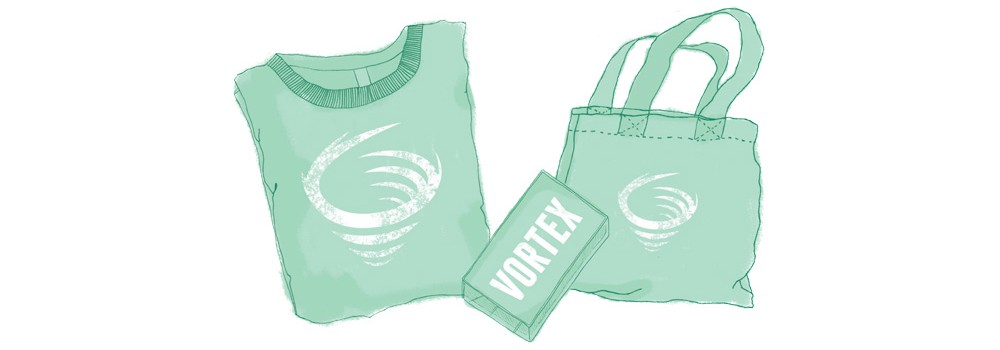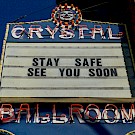 Kelley Roy of ADX, Blake Hickman of Good Cheer, Cheryl Bland of J-Fell Presents and Harefest, and Kill Rock Stars' Portia Sabin recording an episode of The Future of What on this very topic—listen below! Photo by Will Watts“Typically, creative people are horrible at selling their stuff,” Kelley Roy of Portland's makerspace ADX candidly says. “They’re good at making music and products, but when it comes to actually interacting with people and getting them to buy stuff, it’s good to find a friend that is going to sling it for you.”
Kelley Roy of ADX, Blake Hickman of Good Cheer, Cheryl Bland of J-Fell Presents and Harefest, and Kill Rock Stars' Portia Sabin recording an episode of The Future of What on this very topic—listen below! Photo by Will Watts“Typically, creative people are horrible at selling their stuff,” Kelley Roy of Portland's makerspace ADX candidly says. “They’re good at making music and products, but when it comes to actually interacting with people and getting them to buy stuff, it’s good to find a friend that is going to sling it for you.”
She’d know, she’s that friend to numerous musicians and creative maker types. Dubbed the “Portland maker-in-chief” by Portia Sabin, fact is, “selling your creativity feels weird to a lot of people,” says the president of indie label Kill Rock Stars and host of music industry podcast The Future of What. “So just don’t put yourself in that position—get somebody to do it for you,” Sabin tells.
Once upon a time, that entity was the record store. But these days, the onus now overwhelmingly lies upon the musician to be both the artist and the salesperson. And that better be something you’re willing to accept if you want to have a career in music. So when times change, we have to change with them. Here are some tips from DIY merchandisers about how you can make money in today’s music biz.
Create Merch That Matters
Buying a T-shirt, patch, button or koozie at a concert is an emotional purchase—not a necessity. “It’s more important to have a memento of the event that you’re at,” Sabin says. That emotional decision might be driven by the aesthetic appeal of the art on the shirt, an incredible experience you’d like to memorialize, a desire to support the musicians, or simple bragging rights: “I was there!” What matters to you, the music and merch maker, is understanding how you want to represent yourself as well as what your audience is actually willing to pay for.
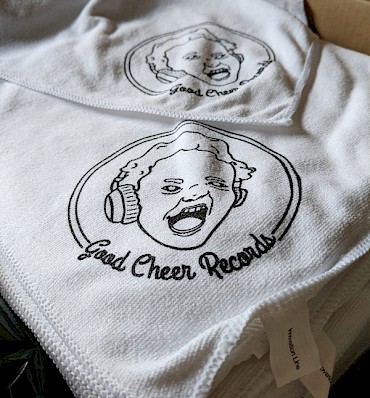 Get your Official Good Cheer Crying Towel on November 4 at the Dour Fir! And listen to The Future of What below to understand why you need one.“When it comes to anything you’re selling as a band, don’t rush or compromise stuff,” Blake Hickman of DIY label Good Cheer Records says. Any products you create are an extension of your music and band, so you should “feel like it matches where your heart is on the record, this thing that you’ve put so much into. It’s worth it just to have it exactly what you want it to be.”
Get your Official Good Cheer Crying Towel on November 4 at the Dour Fir! And listen to The Future of What below to understand why you need one.“When it comes to anything you’re selling as a band, don’t rush or compromise stuff,” Blake Hickman of DIY label Good Cheer Records says. Any products you create are an extension of your music and band, so you should “feel like it matches where your heart is on the record, this thing that you’ve put so much into. It’s worth it just to have it exactly what you want it to be.”
Consider making a statement with your merch. Some artists use merch to say “something about who they are and what their music is about,” Roy says. “The more time that you spend developing your brand collateral as a band, I think people will want it more. Having high-quality stuff over just a bunch of junk is the way to go.” Look at all the artists who’ve had an iconic vision of how they want to represent themselves—Led Zeppelin, Bowie, Prince, The White Stripes—creating an aesthetic that has followed them throughout their careers.
Price It Right
Esoteric considerations aside, you’re in this to make money so you can continue to make music. It’s all about diversification: You want as many people as possible purchasing products at as many price points as they’re willing. “Everybody out there wants to spend a different amount of money on a band,” Sabin says. Some simply have more money and some have a stronger emotional connection to a particular artist. Some will spend $9, some $29, and a few $100 for something they deem valuable. “There are fans who want to spend more,” she says. You just have to give them the opportunity.
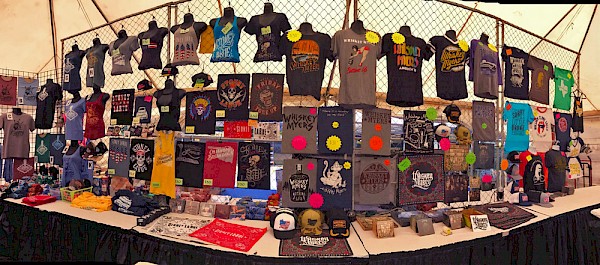 Take a cue from J-Fell Presents' Cheryl Bland and her merch spread at the Wild Hare Country FestKnow your audience and what kind of disposable income they might have. Cheryl Bland runs merch booths for J-Fell Presents at numerous concerts and large festivals, like the annual Harefest and Wild Hare Country Festival. “Think about what kind of cash people have in their pocket,” she advises. Smaller items that are just $5 to $10 may be the right price point “because people might have that much after they’ve paid $20” for the show or beer.
Take a cue from J-Fell Presents' Cheryl Bland and her merch spread at the Wild Hare Country FestKnow your audience and what kind of disposable income they might have. Cheryl Bland runs merch booths for J-Fell Presents at numerous concerts and large festivals, like the annual Harefest and Wild Hare Country Festival. “Think about what kind of cash people have in their pocket,” she advises. Smaller items that are just $5 to $10 may be the right price point “because people might have that much after they’ve paid $20” for the show or beer.
Start Small
“If bands are buying their first merchandise, I encourage them to order a small unit,” Bland tells. And decide who’s footing the bill: Is it simply the band member who can cut the check, or do you collectively save gig money and pool it together?
Not everything can be pressed on vinyl and not everyone is willing to shell out for those records anyways. “You’re spending your own money on your merch so you should think about it and at least get your money back,” Roy says.
Sell Your Merch
“If you’re giving things away, you’re not going to make money,” Bland says. Seems obvious, but don’t just give it all away. It cost you money to make so people have to pay for it—that includes friends and family paying at least cost. “Merchandise is for revenue,” Bland states. If it’s for marketing, then your merch is actually advertising and should be thought of as such—and you should be strategic with how you give it away.
Always Accept Plastic
“A band’s ability to take credit cards really impacts sales,” Bland says. “Make it easy for people to spend money.”
Hang Out at the Merch Table
“People are interested in meeting artists,” Bland says. Sign autographs, take selfies, be social. “At our festivals, I can almost guarantee if a band has musicians come by the merch booth, they will sell more than a band that doesn’t.”
Collect Emails
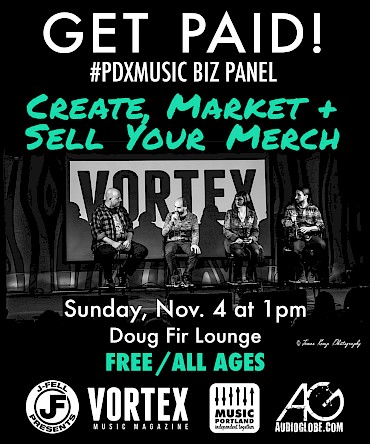 Don't miss our free, all-ages panel on this topic—click for deets!Always look to build your email list so put out a piece of paper while you’re there. “We get more email addresses if we have a raffle,” Bland tells. “Give us your email address and we’ll pick some names for a free shirt.” Marketing, folks!
Don't miss our free, all-ages panel on this topic—click for deets!Always look to build your email list so put out a piece of paper while you’re there. “We get more email addresses if we have a raffle,” Bland tells. “Give us your email address and we’ll pick some names for a free shirt.” Marketing, folks!
Bring Help
“The merch table is where artists connect with their fans, so if you’re talking to somebody and taking photos with them you’re not actually going to be also selling them something,” Sabin describes. Engage with your fans at the merch table—while someone else handles the transaction!
If you want music to be your job, then you have to treat it like a job, always looking for opportunities to monetize your craft. And if that feels uncomfortable to you, then find someone who wants to be your advocate. Your friends and family are your biggest fans and will shout your name from the mountain tops. Now, let them tell everyone to buy your merch!

